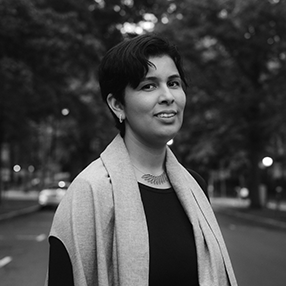They came from the municipalities the cantones the in between children of campesinos day laborers drudges. They crossed water and deserts and left children elders husbands. They were children lovers spouses mothers elders vagabond escapists. They prayed in the back of trucks so hard the virgin mother revealed herself at checkpoint to offer the miracle crossing of another boundary. Something was happening to them. So much had happened where they left. They changed the swelling cities but the cities changed them. They gathered burn marks bruises on their arms in kitchens in hotels in other homes. They hid their names behind other names. They learned and did not learn new language. They crossed themselves waiting for buses car rides late night early in the morning. They entered apartments at twilight where they laid beside sisters friends lovers. What were they dreaming as they slipped into their kitten heels hair cut short madonna-like lips painted red dancing in the discotecas downtown uptown outside the loop. They guarded pictures in their purses. They guarded themselves. They married for love married without it and they did not marry. And they loved they learned and they did not love. Learned to find and tuck themselves into their secret seams. The many things they would not tell their children. With illicit seeds they grow what they left behind among the brush little stems memorials now adornments at their windows.
Copyright © 2023 by Maryam Ivette Parhizkar. Originally published in Poem-a-Day on September 11, 2023, by the Academy of American Poets.
“I wanted to clear ground to begin to tell the story of the migrant women of my mother’s generation. I wanted to name who they were without giving them away and to begin to describe the vibrant, difficult, adventurous, and capacious lives that they had already lived before I knew them. I hope that what I have written here plants a sapling for the stories that have yet to be told—about them and women like them—with complexity, love, permission, and care.”
—Maryam Ivette Parhizkar

